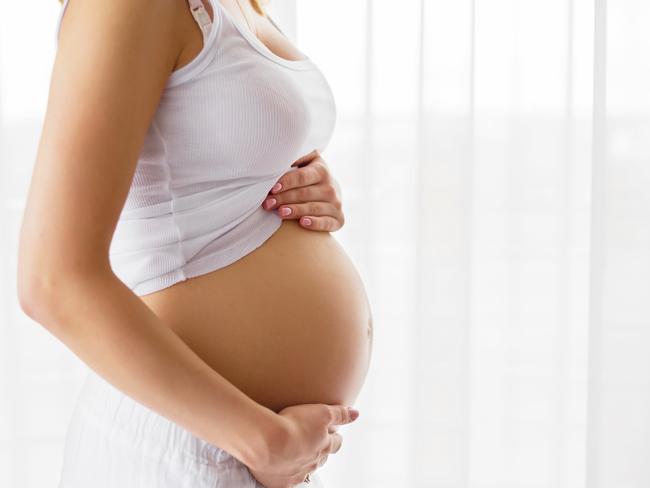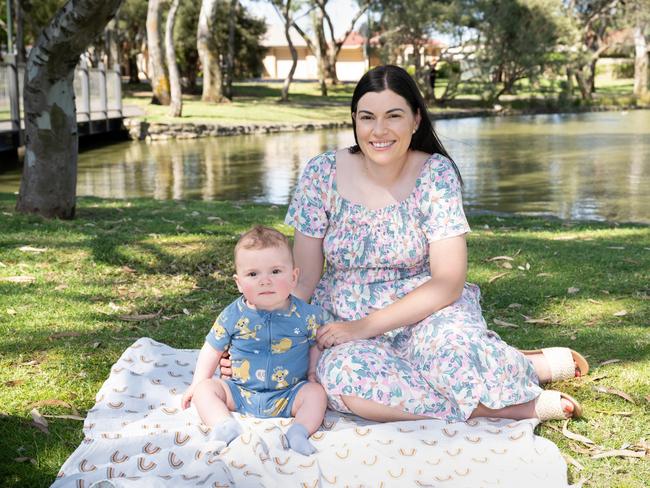Discrimination rampant against working mums, pregnant women
A shocking number of women are being forced to hide their pregnancies from their workplace out of fear they will be sacked. This is what you need to know.
Careers
Don't miss out on the headlines from Careers. Followed categories will be added to My News.
Almost one in four pregnant women are hiding their belly at work, as experts warn impending parenthood costs many Australians their job.
Two decades after it was outlawed, discrimination against pregnant women and mothers is still rampant in Aussie workplaces, startling research reveals.
Preliminary findings in an ongoing University of South Australia study show 23 per cent of women feel they need to hide their pregnancy at work. A quarter are not provided with appropriate workplace breastfeeding facilities, with many forced to express breastmilk in the office toilet instead.
One in five women report their work role was altered against their wishes while they were on maternity leave, and 13 per cent say they were treated so badly they had no option but to resign.
More than 60 per cent of new mothers returning to work feel excluded and ignored and say they have been given unmanageable workloads.
“It’s pretty shocking,” says study author and UniSA researcher Dr Rachael Potter. “The amount of discrimination or disadvantage experienced is really quite vast.
“We do need to push forward (with progress) quite quickly because this shows that things haven’t really changed that much at all (since the introduction of discrimination laws).”

Common ground for dismissal
Industrial and employment law expert Nick White, from Gordon Legal, handles many claims brought by women who have been made redundant after informing their employer of their pregnancy. He says he is not surprised by the study findings and in many cases, claims of discrimination are unsuccessful.
“(Pregnancy) is one of the more common grounds (for claims of unfair dismissal),” White says.
“A woman with an otherwise unblemished employment history and no performance or conduct issues will disclose a pregnancy to their employer and, not long after that, they will be approached about their position being made redundant or about performance concerns or conduct concerns with a view to terminating the employment rather than allowing them to proceed to take (parental) leave.
“In that scenario, (unfair dismissal) is very difficult to prove. (Discrimination) might seem obvious … but an employer will usually have some sort of justification ready to show that the position is, in fact, redundant.”
Precautionary measures
While White stresses the responsibility to provide a fair workplace rests with employers, he believes the findings do serve as a warning to employees.
“If I was advising someone who was concerned that something might happen after they disclose their pregnancy, one practical thing people can do is to keep good notes of their employment history,” he says.
“Good or bad, it’s important to keep a record of feedback or performance reviews because then it’s going to be easier to show if there is a sudden change in employment once you have disclosed your pregnancy.
“It shouldn’t have to come to that. But people who have these records are often in a better position to protect their rights.”
As soon as workers suspect they have been subject to discrimination – whether due to their parental status or any other grounds – they should immediately seek advice from a legal professional, their union or the Fair Work Ombudsman, White says.
Suffer in silence
Pregnancy discrimination has been “rife” in Australia for almost 30 years, Employee Matters managing director Natasha Hawker says.
She notes that prior to the birth of her own three children, she opted to leave her job and take up contract employment to have more control over her work patterns.
She says recent changes to employment laws are supposed to provide greater protection to pregnant women and parents, but believes updates to workplace policies and training to accommodate the new laws have lagged.
“I also have concerns that many women actually suffer in silence because they need the work,” Hawker says.

Returning from ‘babyland’
Local government worker Luisa Colquist expects to return from parental leave to her role as a people and capability advisor at the City of Tea Tree Gully in January – one year after the birth of her first child, Thomas.
While appalled at the UniSA findings, Colquist is confident her return to work will be far more positive, noting the northern Adelaide council has long been an accredited breastfeeding-friendly workplace.
While on leave, Colquist has used many of the mums and bubs activities offered throughout the council region and keeps in regular contact with her colleagues.
“I do have a very supportive manager and work so I know I will be returning to a positive experience,” she says.
“I’ve stayed in touch with my manager and she contacts me if there’s any changes at work that might impact me or if there’s anything that might be of interest.
“(Returning to work) will be a huge adjustment but I’m looking forward to it after spending so long in babyland.”
Parenting rights
• Workers cannot be fired, demoted or treated differently from other employees because they are pregnant
• Workers on parenting leave are entitled to come back to the job they had before going on leave
• Employers must discuss any significant changes to a worker’s job while they are on parental leave with the relevant employee
• Employees returning from parental leave have the right to request flexible work arrangements
• Not providing adequate facilities or breaks for breastfeeding workers may constitute discrimination and breach work health and safety laws.
Source: Fair Work Ombudsman
Originally published as Discrimination rampant against working mums, pregnant women


